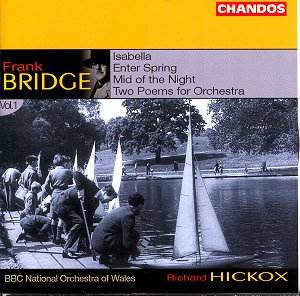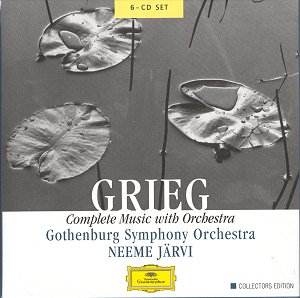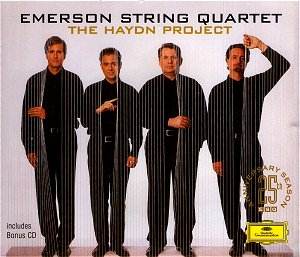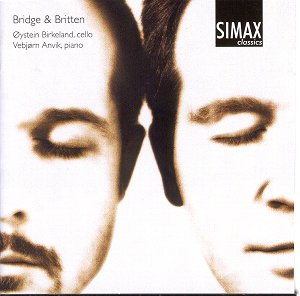 Composer: Frank Bridge (1879-1941)
Composer: Frank Bridge (1879-1941)
Works: Orchestral Music Volume 1
Performers: BBC National Orchestra of Wales / Richard Hickox
Recording Date: 26-27 November 2000
Label: Chandos CHAN 9950
Duration: 75.48
In an era when British orchestral music often played second fiddle to its continental counterparts, Frank Bridge stands out as a figure of both compositional and pedagogical significance. While many may recognize him primarily as the mentor of Benjamin Britten, Bridge’s own oeuvre warrants thorough re-examination, particularly through the lens of Richard Hickox’s recent recording with the BBC National Orchestra of Wales. This disc is the inaugural volume in Chandos’s comprehensive survey of Bridge’s orchestral works, and it sets a high standard for what is to follow.
The program opens with “Enter Spring,” composed in 1927, a rhapsody that captures the essence of the Sussex Downs—Bridge’s home and muse. Here, Hickox’s interpretation shines with a delicate touch, effectively conveying the work’s pastoral charm. The orchestral fabric is rich and multi-layered, with the strings weaving a lush tapestry that evokes the verdant landscape. The pivotal moment arrives with the gradual climactic build, where Hickox skillfully shapes the dynamics, allowing the music to swell with a palpable sense of renewal. This is indeed one of Bridge’s most masterful compositions, and Hickox’s approach emphasizes its innate lyricism and structural coherence—qualities that can be lost in less attentive hands.
Following “Enter Spring,” the disc presents “Two Poems for Orchestra,” works that were introduced by the esteemed conductor Henry Wood in the aftermath of the First World War. These pieces are a study in contrasts: the first, a contemplative tone poem, is imbued with a sense of introspection, while the second brims with vivacity. Bridge’s choice to evoke the writings of Richard Jefferies allows for a rich exploration of nature, with the BBC NOW responding with both sensitivity and flair. In No. 1, the woodwinds offer a haunting quality, capturing the elusive essence of Jefferies’ mysticism, while in No. 2, the vibrant orchestral colors are executed with a sense of joyous abandon. Hickox’s interpretation highlights these distinctions effectively, though one might argue that the titles “Two Poems” lack the evocative power that the music itself embodies.
The symphonic poem “Isabella” emerges as a centerpiece of the recording, revealing Bridge’s narrative ambition through its lush orchestration and thematic development. The dual themes representing Lorenzo and Isabella are beautifully rendered, with the horn’s noble call juxtaposed against the oboe’s tender melody. The emotional arc of the piece is palpable, and Hickox deftly navigates the work’s dramatic contours, ensuring that the tragic narrative unfolds with clarity and poignancy. In comparison to other recordings, such as the one by the London Philharmonic under the baton of David Lloyd-Jones, Hickox’s reading feels particularly intimate, allowing the listener to engage deeply with the emotional undercurrents of the music.
The final work, “Mid of the Night,” represents Bridge’s early stylistic tendencies, and it is here that both the strengths and limitations of the composer are laid bare. At nearly half an hour, the piece meanders through its thematic material, which, while interesting, does not sustain the listener’s engagement as effectively as the later works. Hickox and the orchestra deliver a committed performance, yet one cannot help but feel that the work’s length detracts from its overall impact. The orchestral palette displays Bridge’s early influences, particularly those of Elgar and Tchaikovsky, yet it lacks the imaginative drive of his mature compositions.
Recording quality plays a vital role in this disc’s success; the Chandos engineers have captured the sound with remarkable clarity and depth. The orchestral textures are beautifully delineated, allowing the listener to appreciate the intricate interplay of voices, particularly in the more complex passages of “Isabella.” The resonance of Brangwyn Hall adds a warmth that enhances the listening experience, making for a compelling auditory journey through Bridge’s landscape.
In conclusion, this volume of Frank Bridge’s orchestral works, under Richard Hickox’s astute direction, serves as a commendable introduction to a composer whose contributions have long awaited rediscovery. The recording features a masterwork in “Enter Spring,” alongside intriguing but less impactful pieces, demonstrating Bridge’s evolution as a composer. While “Mid of the Night” may not reach the heights of the later works, it nonetheless provides valuable insights into Bridge’s early stylistic development. Overall, this disc is an essential addition to the repertoire, marking a significant step in the revival of Bridge’s orchestral music and promising an exciting continuation of the Chandos series.


